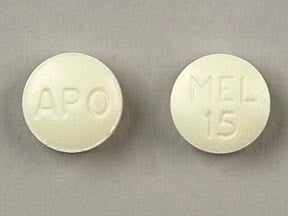
Meloxicam Coupons & Savings Card – Discount Prices from $3.15
Generic for: Mobic
Meloxicam is a prescription medication primarily used to alleviate pain and inflammation associated with various types of arthritis, including osteoarthritis and rheumatoid arthritis, as well as juvenile rheumatoid arthritis. It is classified as a non-steroidal anti-inflammatory drug (NSAID) and is available in different forms such as capsules, tablets, oral suspension, and an injectable form administered by healthcare professionals in a hospital setting.
Meloxicam functions by inhibiting specific proteins known as cyclooxygenase (COX) enzymes, which play a key role in the body's inflammatory response. By preferentially blocking COX-2 over COX-1, meloxicam aims to reduce inflammation, pain, and swelling while potentially offering fewer gastrointestinal and renal side effects compared to other NSAIDs. However, as with all NSAIDs, there is an increased risk of stomach bleeding. Common side effects of meloxicam may include diarrhea, joint pain, and stomach upset.
While meloxicam is effective for managing pain from arthritis, it is important to discuss with your healthcare provider about additional non-drug treatments or alternative medications for pain management, especially for chronic conditions like arthritis. Always consult with your doctor, nurse, or pharmacist to ensure safe and effective use of this medication.
Our coupons are free to use. Before paying, show the pharmacist your Meloxicam savings card to get your free discount. Use our filters below to edit the prescription box to match your needs. The Meloxicam prices will update based on your prescription needs. Above our Meloxicam coupons, you can change your location to see pharmacy prices and costs in other areas. We're here to help you buy Meloxicam at the lowest price with our prescription discount card.
My prescription
Edit
15MG, Meloxicam (30 Tablets)
Select pharmacy

CVS
$18.93
COUPON PRICE
Walmart
$3.15
COUPON PRICE
Walgreens
$9.65
COUPON PRICE
Albertsons
$12.76
COUPON PRICEMeloxicam savings card
Show this card to your pharmacist
Walmart
$3.15
BIN
ID
PCN
GRP
019876
LH84902294
CHIPPO
LHX
Powered by
Meloxicam is a prescription medication primarily used to alleviate pain and inflammation associated with various types of arthritis, including osteoarthritis and rheumatoid arthritis, as well as juvenile rheumatoid arthritis. It is classified as a non-steroidal anti-inflammatory drug (NSAID) and is available in different forms such as capsules, tablets, oral suspension, and an injectable form administered by healthcare professionals in a hospital setting.
Meloxicam functions by inhibiting specific proteins known as cyclooxygenase (COX) enzymes, which play a key role in the body's inflammatory response. By preferentially blocking COX-2 over COX-1, meloxicam aims to reduce inflammation, pain, and swelling while potentially offering fewer gastrointestinal and renal side effects compared to other NSAIDs. However, as with all NSAIDs, there is an increased risk of stomach bleeding. Common side effects of meloxicam may include diarrhea, joint pain, and stomach upset.
While meloxicam is effective for managing pain from arthritis, it is important to discuss with your healthcare provider about additional non-drug treatments or alternative medications for pain management, especially for chronic conditions like arthritis. Always consult with your doctor, nurse, or pharmacist to ensure safe and effective use of this medication.
Our coupons are free to use. Before paying, show the pharmacist your Meloxicam savings card to get your free discount. Use our filters below to edit the prescription box to match your needs. The Meloxicam prices will update based on your prescription needs. Above our Meloxicam coupons, you can change your location to see pharmacy prices and costs in other areas. We're here to help you buy Meloxicam at the lowest price with our prescription discount card.
Related NSAIDs prescriptions
More prescriptions for rheumatoid arthritis
coupons from$1120.07Save 73%
coupons from$2385.99Save 72%
coupons from$17.34Save 52%
coupons from$17.34Save 52%
coupons from$1487.45Save 72%
coupons from$7.93Save 67%
coupons from$9.65Save 78%
coupons from$17.34Save 52%
Related NSAIDs prescriptions
Naprosyn Save 74%coupons from $6.55
Zorvolex Save 93%coupons from $55.74
Elyxyb Save 74%coupons from $132.35
Meclofenamate Save 58%coupons from $241.18
Salsalate Save 60%coupons from $26.66
Cambia Save 97%coupons from $89.85
Bromsite Save 80%coupons from $87.84
Daypro Save 49%coupons from $32.68
More prescriptions for rheumatoid arthritis
Actemra Save 73%coupons from $1120.07
Kevzara Save 72%coupons from $2385.99
Goodsense Aspirin Adult Low St Save 52%coupons from $17.34
Ft Aspirin Save 52%coupons from $17.34
Orencia Save 72%coupons from $1487.45
Aleve Save 67%coupons from $7.93
Aleve Arthritis Pain Save 78%coupons from $9.65
Eq Aspirin Low Dose Save 52%coupons from $17.34
Meloxicam dosage forms
Use our Meloxicam 7.5MG coupon with prices from $2.71 for 10 Tablets. You can also use our Meloxicam 7.5MG coupon with prices from $2.79 for 14 Tablets. We have a Meloxicam 7.5MG coupon with prices from $2.82 for 15 Tablets. You can use our Meloxicam 7.5MG coupon with prices from $3.13 for 30 Tablets.
Dosage Quantity Price from Per unit 7.5MG 10 Tablets $2.71 $0.27 7.5MG 14 Tablets $2.79 $0.20 7.5MG 15 Tablets $2.82 $0.19 7.5MG 30 Tablets $3.13 $0.10 7.5MG 60 Tablets $3.76 $0.06 7.5MG 90 Tablets $10.89 $0.12 7.5MG 180 Tablets $18.07 $0.10 15MG 30 Tablets $3.15 $0.10 15MG 7 Tablets $2.65 $0.38 15MG 10 Tablets $2.72 $0.27
| Dosage | Quantity | Price from | Per unit |
|---|---|---|---|
| 7.5MG | 10 Tablets | $2.71 | $0.27 |
| 7.5MG | 14 Tablets | $2.79 | $0.20 |
| 7.5MG | 15 Tablets | $2.82 | $0.19 |
| 7.5MG | 30 Tablets | $3.13 | $0.10 |
| 7.5MG | 60 Tablets | $3.76 | $0.06 |
| 7.5MG | 90 Tablets | $10.89 | $0.12 |
| 7.5MG | 180 Tablets | $18.07 | $0.10 |
| 15MG | 30 Tablets | $3.15 | $0.10 |
| 15MG | 7 Tablets | $2.65 | $0.38 |
| 15MG | 10 Tablets | $2.72 | $0.27 |
| 15MG | 14 Tablets | $2.80 | $0.20 |
| 15MG | 15 Tablets | $2.83 | $0.19 |
| 15MG | 90 Tablets | $10.96 | $0.12 |
